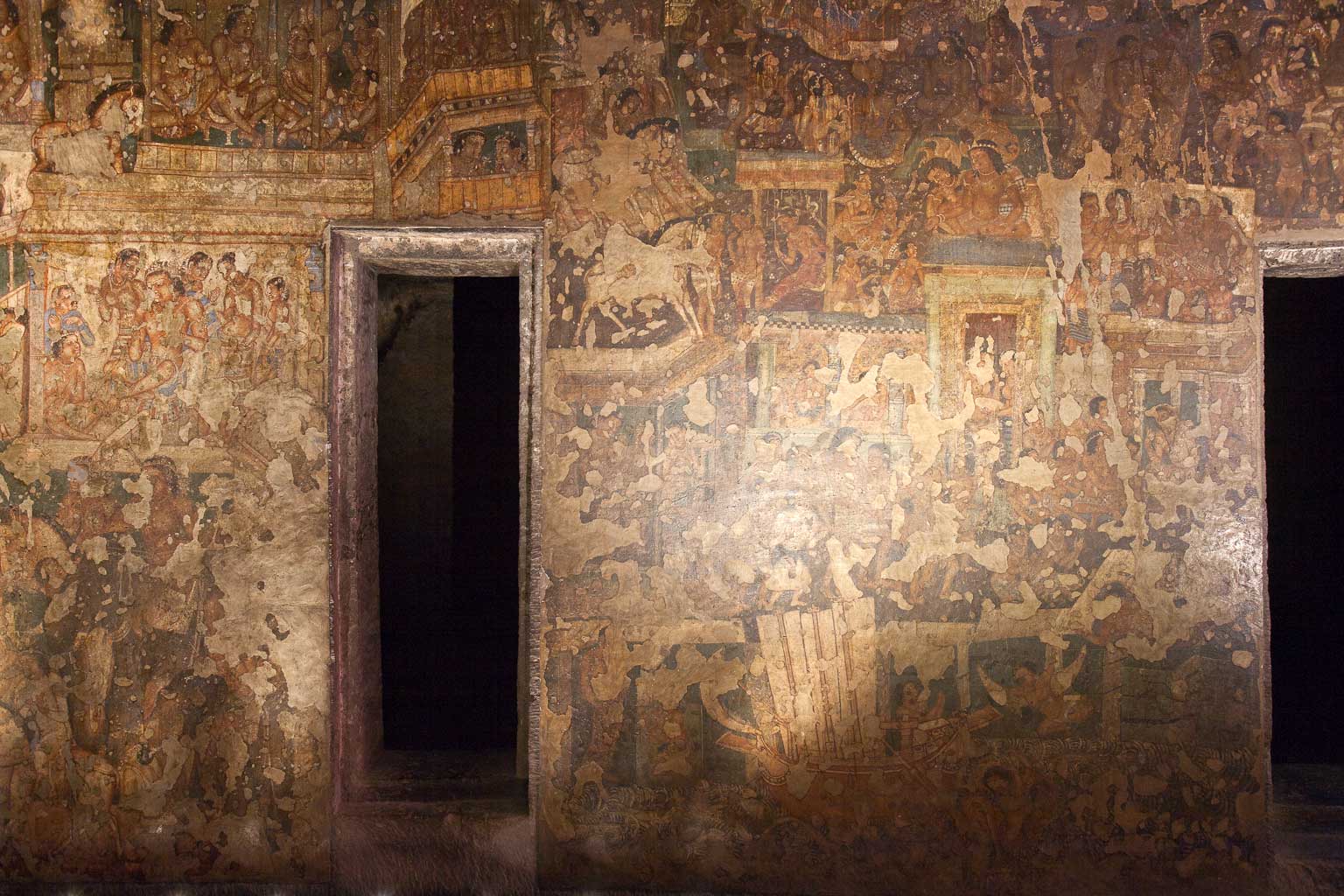Cave No. 2
Identification: Foucher (1921, narrative no. 3). The legend is from the life of the Buddha.—
Bhava was a merchant from the ancient city of Śūrpāraka or Śroṇāparāntaka, today’s Nala Sopārā in the Mumbai region. When he fell ill, his wife and sons refused to take care of him. Instead, a maid nursed him back to health. So, he offered a reward to the maid. Instead she requested him to accept her as a partner by law. Bhava accepted the proposal.
In due course, she gave birth to a son from Bhava, his fourth son through whom all wishes were supposed to be fulfilled. So, the son was named Pūrṇa (fulfilment) who grew up to become a successful businessman. Once, when his three elder brothers returned from a sea voyage, Bhava lay in his deathbed. He summoned all of them and advised them to stay together, and to defy their wives if they tried to separate them. He especially asked his eldest son to look after Pūrṇa.
After Bhava’s death, the brothers embarked on yet another sea voyage, assigning Pūrṇa the job of looking after the business and family. Pūrṇa was always honest and just. However, once, by chance, the wives of his two brothers received their shares of profit somewhat late while the elder brother’s son received his portion in time. When the three brothers returned, the two younger wives complained about this, putting the blame squarely on Pūrṇa. They persuaded them to abandon the joint family system and go
their separate ways. At the time of settlement, Pūrṇa was denied his share of the property as he was the maid’s child. The eldest brother, who was committed to the promise made to his father, inherited Pūrṇa by renouncing his own share.
Once, the children were crying because they were very hungry. Pūrṇa’s eldest sister-in-law gave him a coin to buy some food. In the market, Pūrṇa traded in sandalwood with a single coin and ended up multiplying it due his business acumen. He not only brought the food home but also some left over sandalwood.
Gradually, Pūrṇa became a noted sandalwood trader with a licence for overseas trade. His fame as a successful tradesman spread as far as the city of Śrāvastī. The other merchants also went to Śūrpāraka to commence a sea voyage under Pūrṇa’s direction. Pūrṇa heard the teachings of the Buddha when he lodged at the Jetavana monastery in Śrāvastī. He was deeply impressed. He wanted to become a monk and obtained his brother’s permission to visit Śrāvastī. After he enrolled in the monastic order, he connected with a mountain tribe. He founded a monastery and converted many of the tribes to Buddhism.
Meanwhile, his two brothers met the eldest brother so that they could embark on yet another sea voyage in search of riches. Their inherited wealth was nearing its end. During this voyage, they found sandalwood trees on the shore. The merchants wanted to acquire the trees but the forest belonged to a yakṣa, who conjured a cyclone to destroy the ship. The elder brother reminded the others that Pūrṇa was a Buddhist monk and advised them to call out to him. Pūrṇa came to know through the deities that his brothers were in danger. Instantly, he emerged on board the ship and calmed the cyclone with his meditative powers. The yakṣa was impressed with Pūrṇa’s abilities and donated the sandalwood trunks to build a monastery.
Pūrṇa himself supervised the construction of the monastery at Śūrpāraka. His brothers got the requisite royal patronage to send an invitation to the Buddha to visit Śurpāraka. In a miraculous way, Pūrṇa sent the offerings to the Buddha. The Buddha flew from Śrāvastī with his entourage. When they reached Śūrpāraka, they were respectfully welcomed by the king and the four brothers. There, the Buddha delivered a sermon, which led many citizens to his doctrine.
—Source: Singh 2019, 31-3 Schlingloff 2013, I, 444-446








